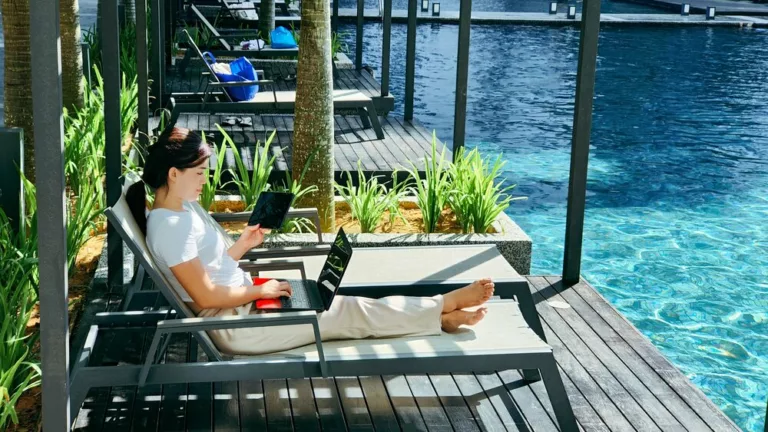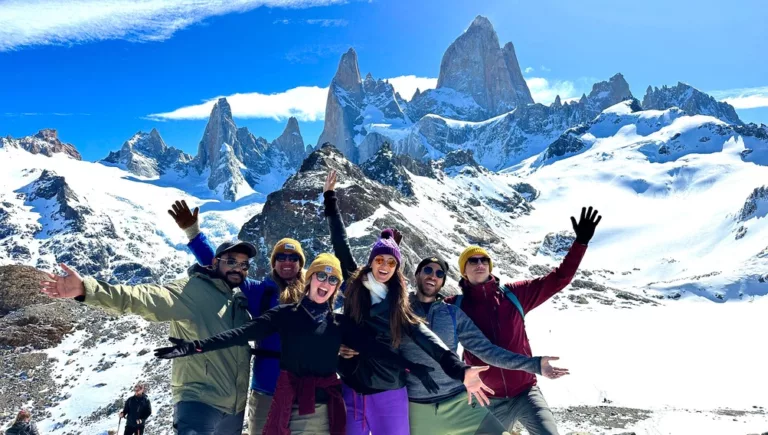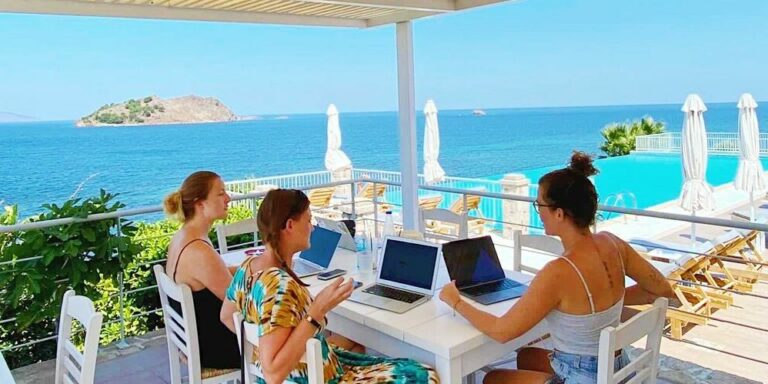We asked our wonderful alumni community to answer four questions:
1 – How did you create the opportunity for yourself to work remotely?
2 – How do you sustain working remotely?
3 – Why do you work remotely?
4 – Your top piece of advice for someone who wants to work remotely but doesn’t know where to begin
And here’s what they said…
Amna Sharmin, Freelance writer
1 – How did you create the opportunity for yourself to work remotely?
At first, I didn’t tell my clients I’d left town. I just scheduled all my meetings within a few days and swung through NYC for them. When I made a career shift on the road, I started to focus on working with clients who were focused on the deliverables and not on seeing my butt in a chair in the office 40 hours/week. When you’re able to set clear expectations, keep an open line of communication, and deliver good work, most clients or colleagues don’t care whether you’re across the office or across the world.
2 – How do you sustain working remotely?
I’ve always worked from home so the learning curve to take my work on the road was relatively easy. I didn’t have to figure out how to motivate myself or what my workspace needed to be like, but those are both important things to know about yourself.
I cluster my work and because I’m on several different projects at once, I’ll task switch when I hit a wall and need some time for my subconscious to find a way around a block. I’ll work on client A’s project until I hit a block and then client B’s project etc. Sometimes that’s 1 Pomodoro. Sometimes it’s 5. I don’t Pomodoro when I write because I find it disrupts my flow.
3 – Why do you work remotely?
I’ve always worked remotely. Back in 2006, it was “working from home” and I lived in NYC instead of roaming the world. Roaming the world is more fun, especially since I get to avoid NYC winters now.
I don’t do well sitting in an office 40+ hours/week, 50 weeks/year. My best work is in the mornings and in the evenings and I’d rather take advantage of that. Tuesday afternoons are for napping. Saturday nights are for focused work. It’s much better that way.
4 – Your top piece of advice for someone who wants to work remotely but doesn’t know where to begin
Have a plan and be okay with the fact that it’s going to change as you learn more about yourself as a remote worker and hopefully nomad. If you’re new to remote work and have fulltime job, try to take your job remote. If you’re already freelancing, line up as many steady clients as you can before you hit the road. Not worrying about your cash flow will make all the other major changes in your life less stressful.
Faun deHenry, Business strategist and founder of About Work & Life
1 – How did you create the opportunity for yourself to work remotely?
I started working remotely in 1990 when I was pregnant with my first child. My client suggested that I begin remote work so that I could continue managing her project and care for my little girl.
2 – How do you sustain working remotely?
I communicate daily with my clients and provide them with 100% transparency into my progress on their projects.
3 – Why do you work remotely?
I like the flexibility that remote working provides. Sometimes my work requires total quiet and concentration. I can achieve that with remote work better than if I worked on a client’s site.
4 – Your top piece of advice for someone who wants to work remotely but doesn’t know where to begin
Make certain that you have a really solid emotional support system. I wouldn’t have succeeded without mine.
AJ Adams, Freelance designer
1 – How did you create the opportunity for yourself to work remotely?
Not on purpose, but not on accident either. I was working for a company I didn’t enjoy, so I decided to resign and pick up some freelance work as a stop-gap maneuver until I landed a new position. Whether it’s a job, a relationship, or a drive-through milkshake, I think nature generally rewards exiting too early over persisting too long.
Freelancing was supposed to be an interim play, but when a dreamy job crossed my path 9 months down the road, I chose to turn it down. Freelancing is a grind—especially at first—but, much like traveling, over time ambiguity gives way to clarity and all the bitter discomforts turn savory.
2 – How do you sustain working remotely?
Through people. I work with startups to design all the things, so I put myself where startups are, like coworking spaces, nomad trips, and geeky corners of the internet. Networking in a LinkedIn sense is gross, but being fascinated by new people and new projects is natural. And that’s just the financial aspect. The funny thing about working remotely is that all the hard stuff is still hard, like work and taxes, but when you’re working remotely all the easy stuff is also hard, like laundry.
Without friends on-the-ground wherever you’re traveling, your chances of going commando hockey-stick toward a probability of 1. I’ve been lucky enough to meet great folks, and those relationships have been deeply nourishing, not to mention mission-critical for simple logistics.
3 – Why do you work remotely?
Why not? A friend of mine recently noted that most jobs are already remote, we just do them from an office. I love whiteboards, sticky notes, and ping pong, but, even when I worked from an office, most decisions and day-to-day communication happened in video calls and chat apps. And for me, working remotely isn’t about leaving home to explore new places—it’s about increasing optionality in where home is. Sometime in the next two years, I want to live in New York.
In a fixed-location job, if I wanted to move to New York I’d likely need to change jobs and make other low-elasticity decisions. As a remote worker, I just buy a plane ticket and roll with the punches. Say I don’t like New York: well I’ll just leave and go someplace else. It’s difficult to pin a price tag on that kind of flexibility.
4 – Your top piece of advice for someone who wants to work remotely but doesn’t know where to begin
You can do it. Hands down, it’s within your grasp in one form or another. However, every decision carries opportunity cost. I’m standing on the deck of my “life as a remote worker” ship right now as I watch my “life as an Austinite” ship with it’s garden and dog and weekly trips to The Little Deli slip into the mist. That being said, I’d encourage everyone to make their life remote, regardless of how remote they choose to live it.
When you have the flexibility to select where you work, it paints whichever place you choose to live in a thicker coat of meaning. Even if you don’t leave, suddenly you are living somewhere by direct choice—not because of job constraints, not because of inertia—and that’s fucking cool.
Ali Greene, HR manager
1 – How did you create the opportunity for yourself to work remotely?
Timing, good luck, and not being afraid to put what I want out there.
It began in New York City, as most stories do, I was on my way up the ladder of traditional career success. I had my own apartment in a trendy part of Brooklyn and a job in Learning and Development working for an advertising company in the city. Despite all this traditional success, I wanted more. I had dreams (albeit somewhat cliché ones looking back) of trading in Madison Avenue for Machu Picchu.
When it came time to give notice, I found myself in a unique position. I became the point person in my functional area on a large cross functional project, after my team of three slowly became just me. The conversation turned from negotiating an end date, to how my desires to travel were in the background of wanting to leave NYC and how I could support the team remotely until my replacement was found. This arrangement turned into a longer-term consulting relationship, which led to working with other companies and experimenting with different formats of location independent work.
2 – How do you sustain working remotely?
I currently work full time for one company as Director of People. Outside of traditional HR responsibilities I focus on helping shape our company culture that supports effective communication and teamwork for our fully distributed, global employee base.
*Why do you work remotely?*
Remote work gives me the type of control and ownership I desire. It allows me to arrange my schedule in a way to optimize working effectively, efficiently, and prioritizing my personal and professional life in a holistic way
Right now, my life of remote work includes lots of exploration and travel. I am writing this while on a plane to Nairobi, where I plan to live and work for the month of September. Earlier this summer I worked in Belgrade where I admired the grit of the street art as I made my way from one café to another; from a remote part of Montenegro where my lunch breaks regularly consisted of SUP or kayaking adventures; and from Barcelona where jumping on calls with colleagues in USA time zones meant getting the second-wind necessary to stay awake for late night tapas and street festivals.
I do see a future where my life of remote work won’t necessarily mean continuing to be nomadic. The benefits of remote work translates to a more satisfying “traditional” life as well, not having to choose between participating in conference calls, running errands, enjoying yoga classes, and cooking family dinners sounds like someone who truly has it all.
3 – Why do you work remotely?
It is this freedom and flexibility that is my main motivation to work remotely. I know with remote work whatever the future has in store for me, it likely won’t be based on geographical constraints of my job. That is super rewarding!
4 – Your top piece of advice for someone who wants to work remotely but doesn’t know where to begin
Self-awareness is everything! There are many drawbacks to choosing this as an alternative way of working and living. To be successful you have to know yourself to know if remote work is for you.
Think about:
– Productivity: Do you know what environments you need to do your best work? What time of day are you most productive? Have you been able to successfully motivate yourself to work on your own? Do you work better with routine? Can you create a remote routine that works for you?
– Ability: Do you have the right tools to communicate with peers, clients, and stakeholders? Does your job involve creating physical things or spending time in physical places?
– Connection: How important are the social connections to you at work? Do you like to be heads down in your work or rather inspired by other individuals? How do you seek out meaningful connections?
If you can’t answer or at least haven’t yet asked yourself some of those questions, maybe you need to spend time on self-exploration before packing your bags and exploring the world!







